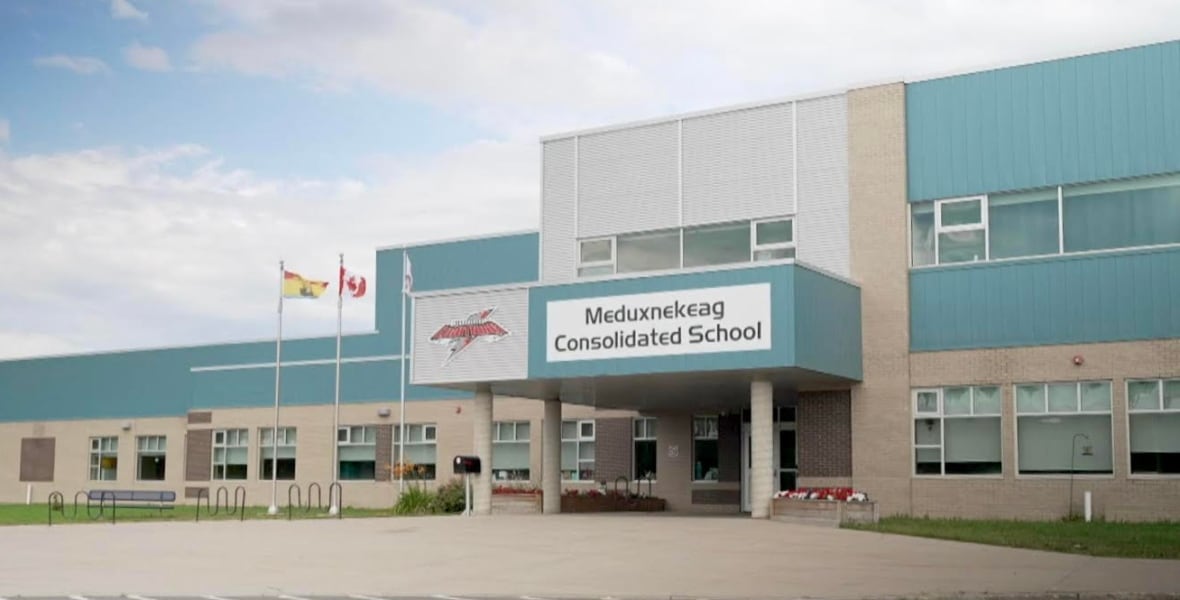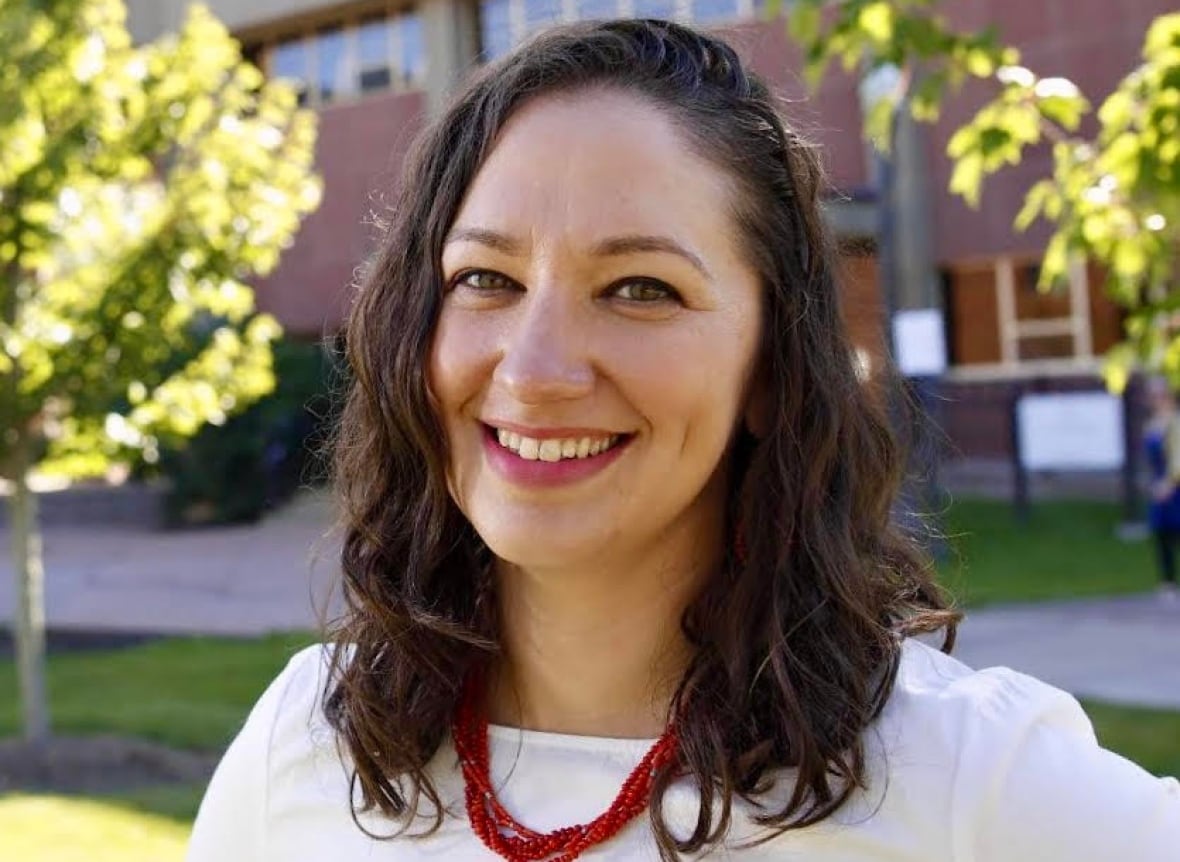Library limbo: Families fear impact of library cuts this fall
Province considering its response to labour board ruling ordering library workers back

Griffin Barry shows off a stack of books he's reading this summer, which includes graphic novels about coding, Minecraft and Lego.
There's also a novel from his favourite Canadian author, Gordon Korman, and a guide to surviving certain encounters in the wilderness.
Griffin has a wide range of interests, and he can easily find books to support them in the aisles of the Meduxnekeag Consolidated School library, where he spends his lunch hours poring over books and chatting with a library worker.
But he is concerned about the coming year and where he will spend that time and how he will access those books. Library workers in his school district, Anglophone West, as well as in Anglophone South, were eliminated for next year.
There's no clear answer on whether school libraries will open at all without staff.
"Schools need libraries," said Griffin, who is going into Grade 8. "It's one of the best places to learn."

Griffin said the library worker at his school also held a writing club for children to create and publish their own books on Amazon. She would also put on soft music to create a fun and welcoming space for students like him.
He can't understand why the district changed direction.
"It removes a cornerstone of the school," he said. "It removes a safe space. It makes a hole in the school structure."
Anglophone West eliminated 32 library positions in April when school districts were told to reduce spending by a combined $43 million. Anglophone South followed suit in June eliminating another 18 positions there. And Francophone South cut some of its library workers too.
But last week, the New Brunswick Labour and Employment Board ordered the province to reinstate library workers in all three of those school districts. Education Minister Claire Johnson said she'll need time to review the decision.
In some cases, teachers were allowed to pull some library books into their own classroom collections, but it's a small concession, according to Griffin's mother, Alison Orr.
"There's been tears in my house, and not just from my kids," she said. "I want them to have somewhere that they feel safe, that they're not being graded, that they're not being evaluated, that they're just accepted and they're welcome and they're wanted. And there's not a lot of places like that in a school."
Orr said the library worker devoted her own time to making it an inclusive space, adding that she wouldn't get a lunch herself "because she's spending those extra minutes … that value added with my kids. And that's an individual that our kids have lost."
According to documents obtained through a right to information request, the Anglophone West School District didn't conduct any assessment or evaluation of the impact the library cuts would have on schools, staff or students. It's something Orr said should never have happened.

"I think it's ridiculous," she said. "I think it's short-sighted on their part. It's a little bit ignorant too, to not think that our kids have something to say."
Logan Acheson has signed out hundreds of books from the Woodstock High School library, where he graduated from in June. He's now preparing for classes at the New Brunswick Community College, where he'll be studying cybersecurity, but he feels sorry for the students coming up behind him.
"I had such a relationship with my librarian," he said. "She knew me by name, she knew my preferences, she knew what I liked. She's a good friend of mine, and knowing that the students wouldn't have that experience in the future really made me feel bad."
But the decision to cut the position also didn't come as a surprise. In recent years, Acheson said, the library worker wasn't on site as much, which meant the main library doors were often locked and the lights turned off. He and others would access the space through a second-floor entrance, but books couldn't be checked out.
"I feel like the libraries have been kind of an afterthought these last few years," he said. "They haven't really been updating them with the amount of funding that they need to get new books."
Libraries undervalued, easy targets
Rachel Rubin has worked in public libraries, academic libraries and research institutions for 20 years and is now the Dean of Libraries and Archives at Mount Allison University. She said it's a troubling trend to see school districts move in this direction.
"It's important to acknowledge that budget cuts are hard, and you have to make difficult choices," she said. "But to eliminate an entire ecosystem of services and resources for students and teachers, I think it's really problematic. It makes it difficult both for students to succeed and for teachers to succeed."
Rubin said access to school libraries and library workers has a direct impact on literacy scores, which is an area where New Brunswick has historically fallen short.

In November, New Brunswick's Child and Youth Advocate, Kelly Lamrock, raised the alarm over a continued decline in literacy scores among younger students, with Grade 4 results for anglophone students dipping by one per cent across the province, the fourth year in a row there's been a decline.
Rubin said libraries have historically been undervalued, without a clear understanding of their impact on student learning and engagement.
"We don't think about the role of librarian as educator and we don't think about the role of librarian as partner with the teachers who are in a school. And you know, frankly, we're a field of traditionally women. And so, as with teachers themselves, women's professions are often marginalized."
Classroom libraries not an even trade
Acheson said the move toward classroom libraries will never compare to the thousands of books at their fingertips in their school library. He said forcing students to cherry pick from a limited collection, or shop around from class to class for a new novel, is nonsense, adding that some teachers don't allow their books to be checked out anyway.
Meanwhile, the loss of that space as a lunchtime option will likely leave those same students sitting in a classroom, he said, for one more hour of the day. To him, the library was a treasured space, and it got him through some tough times too.
"I've read constantly to help with mental health or to learn about new things and if students don't have access to these it can really affect people," he said, "I worry about the students in the future because some people just don't have that kind of escape. And it's a healthy escape in my opinion."
Rubin said a limited classroom library also makes it harder to appeal to all readers.
"Students read at different levels and they're interested in different things, and there's no way for a teacher to have that same breadth in their classroom," she said. "It's really that partnership between the classroom library and the school library that allows that love of reading and the love of literacy to thrive."
Rubin added that with our worlds now being dominated by sound and stimulation, libraries are one of those last remaining sanctuaries to read or reflect. She said it's crucial at all grade levels, as well as in the university setting where she works, to give students that quiet space to study or just be still.


